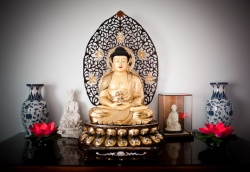To Nakulapita
Saɱyutta Nikāya:
III. Khandhā Vagga:
22: Khandhāsaɱyutta
Sutta 1
Nakulapita Sutta
To Nakulapita
Translated from the Pali by Thanissaro Bhikkhu.
I have heard that on one occasion the Blessed One was living among the Bhaggas at Crocodile Haunt in the Bhesakala Grove at the Deer Park.
2. Then the householder Nakulapita went to the Blessed One and on arrival, having bowed down to him, sat to one side.
3. As he was sitting there he said to the Blessed One, "Lord, I am a feeble old man, aged, advanced in years, having come to the last stage of life. I am afflicted in body and ailing with every moment. And it is only rarely that I get to see the Blessed One and the monks who nourish the heart. May the Blessed One teach me, may the Blessed One instruct me, for my long-term benefit and happiness."
4. "So it is, householder. So it is. The body is afflicted, weak, and encumbered. For who, looking after this body, would claim even a moment of true health, except through sheer foolishness? So you should train yourself: 'Even though I may be afflicted in body, my mind will be unafflicted.' That is how you should train yourself."
5. Then the householder Nakulapita, delighting in and approving of the Blessed One's words, rose from his seat and — bowing down to the Blessed One and circumambulating him, keeping him to his right — went to Ven. Sariputta and on arrival, having bowed down to him, sat to one side. As he was sitting there, Ven. Sariputta said to him, "Your faculties are clear and calm, householder, your complexion pure. Have you had the opportunity today of listening to a Dhamma talk in the presence of the Blessed One?"
"How could it be otherwise, lord? I have just now been sprinkled by the Blessed One with the deathless ambrosia of a Dhamma talk."
"And how were you sprinkled by the Blessed One with the deathless ambrosia of a Dhamma talk?"
"Just now I went to the Blessed One and on arrival, having bowed down to him, sat to one side. As I was sitting there I said to him, 'Lord, I am a feeble old man, aged, advanced in years, having come to the last stage of life. I am afflicted in body and ailing with every moment. And it is only rarely that I get to see the Blessed One and the monks who nourish the heart. May the Blessed One teach me, may the Blessed One instruct me, for my long-term benefit and happiness.'
"When this was said, the Blessed One said to me, 'So it is, householder. So it is. The body is afflicted, weak, and encumbered. For who, looking after this body, would claim even a moment of true health, except through sheer foolishness? So you should train yourself: "Even though I may be afflicted in body, my mind will be unafflicted." That is how you should train yourself.' That's how I was sprinkled by the Blessed One with the deathless ambrosia of a Dhamma talk."
"But why didn't it occur to you to question the Blessed One further: 'In what way is one afflicted in body and afflicted in mind? And in what way is one afflicted in body but unafflicted in mind?'
"I would come from a long way away to hear the explication of these words in Ven. Sariputta's presence. It would be good if Ven. Sariputta himself would enlighten me as to their meaning."
"Then in that case, householder, listen and pay close attention. I will speak."
"As you say, lord," the householder Nakulapita responded.
Ven. Sariputta said: "Now, how is one afflicted in body and afflicted in mind?
"There is the case where an uninstructed, run-of-the-mill person — who has no regard for noble ones, is not well-versed or disciplined in their Dhamma; who has no regard for men of integrity, is not well-versed or disciplined in their Dhamma — assumes form (the body) to be the self, or the self as possessing form, or form as in the self, or the self as in form. He is seized with the idea that 'I am form' or 'Form is mine.' As he is seized with these ideas, his form changes and alters, and he falls into sorrow, lamentation, pain, distress, and despair over its change and alteration.
"He assumes feeling to be the self, or the self as possessing feeling, or feeling as in the self, or the self as in feeling. He is seized with the idea that 'I am feeling' or 'Feeling is mine.' As he is seized with these ideas, his feeling changes and alters, and he falls into sorrow, lamentation, pain, distress, and despair over its change and alteration.
"He assumes perception to be the self, or the self as possessing perception, or perception as in the self, or the self as in perception. He is seized with the idea that 'I am perception' or 'Perception is mine.' As he is seized with these ideas, his perception changes and alters, and he falls into sorrow, lamentation, pain, distress, and despair over its change and alteration.
"He assumes (mental) fabrications to be the self, or the self as possessing fabrications, or fabrications as in the self, or the self as in fabrications. He is seized with the idea that 'I am fabrications' or 'Fabrications are mine.' As he is seized with these ideas, his fabrications change and alter, and he falls into sorrow, lamentation, pain, distress, and despair over their change and alteration.
"He assumes consciousness to be the self, or the self as possessing consciousness, or consciousness as in the self, or the self as in consciousness. He is seized with the idea that 'I am consciousness' or 'Consciousness is mine.' As he is seized with these ideas, his consciousness changes and alters, and he falls into sorrow, lamentation, pain, distress, and despair over its change and alteration.
"This, householder, is how one is afflicted in body and afflicted in mind.
"And how is one afflicted in body but unafflicted in mind? There is the case where a well-instructed disciple of the noble ones — who has regard for noble ones, is well-versed and disciplined in their Dhamma; who has regard for men of integrity, is well-versed and disciplined in their Dhamma — does not assume form to be the self, or the self as possessing form, or form as in the self, or the self as in form. He is not seized with the idea that 'I am form' or 'Form is mine.' As he is not seized with these ideas, his form changes and alters, but he does not fall into sorrow, lamentation, pain, distress, or despair over its change and alteration.
"He does not assume feeling to be the self...
"He does not assume perception to be the self...
"He does not assume fabrications to be the self...
"He does not assume consciousness to be the self, or the self as possessing consciousness, or consciousness as in the self, or the self as in consciousness. He is not seized with the idea that 'I am consciousness' or 'Consciousness is mine.' As he is not seized with these ideas, his consciousness changes and alters, but he does not fall into sorrow, lamentation, pain, distress, or despair over its change and alteration.
"This, householder, is how one is afflicted in body but unafflicted in mind."
That is what Ven. Sariputta said. Gratified, the householder Nakulapita delighted in Ven. Sariputta's words.


